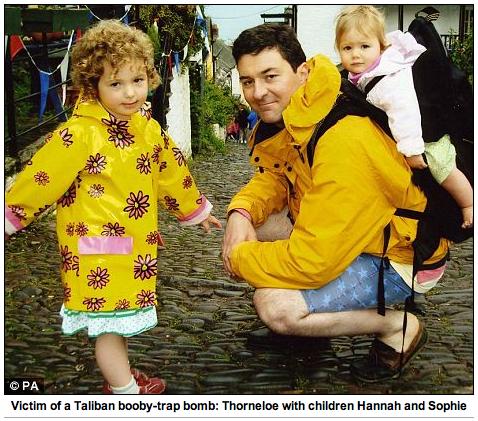
The acute shortage of helicopters in southern Afghanistan has been an issue for years - as has been the relatively poor kit the British Army is given to fight with. Both in classified and open source it has been a sore subject.
Not just the Brits, but the Canadians as well - and the smaller nations that are with them like the Danes and the Estonians - the helicopter shortage has been a huge challenge. The USA has helped since '07 to fill in the gaps when NATO force generation couldn't, and "Jingle Air" using civilian helicopters as relieved some of the load for cargo as well; but on average the Europeans are still waiting for someone to come through the Fulda Gap.
However, sometimes a tragic story can help move a support issue. I think this might be one.
The most senior soldier to be killed in Afghanistan foreshadowed his own death in a damning memo about the shortage of helicopters.
Lieutenant Colonel Rupert Thorneloe told his superiors that British troops would die because they were being forced to make trips by road.
Less than a month later, he was blown up by a roadside bomb.
In his final despatches to commanders in London, classified 'Nato Secret', he had dismissed helicopter operations in Afghanistan as 'not fit for purpose'.
The leaked email, seen by the Daily Mail, dramatically undermines Gordon Brown's claims that helicopter shortages have not caused the deaths of troops fighting the Taliban.
...
Colonel Thorneloe, 39, commander of the 1st Battalion Welsh Guards, died with Trooper Joshua Hammond on July 1 when their convoy set off an improvised explosive device (IED) during a patrol north of the town of Lashkar Gah.
On June 5, he had chillingly predicted the circumstances of his own death in his weekly report to the Ministry of Defence.
Headed 'Battle Group Weekly Update', it reads: 'I have tried to avoid griping about helicopters - we all know we don't have enough.
'We cannot not move people, so this month we have conducted a great deal of administrative movement by road. This increases the IED threat and our exposure to it.'
Colonel Thorneloe goes on to spell out in graphic terms how he had 'virtually no' helicopters of the type which would allow him to move troops by air rather than road. He added: 'The current level of SH (support helicopter) support is therefore unsustainable.'"Fair" or not, because of his seniority, his death will get more attention. Perhaps this will help turn the attention towards the funding the British Army needs. Perhaps.
Even in death, there are ways a leader can continue to help his soldiers. Perhaps his family's loss can be mitigated in some small way by the fact that through his death, perhaps he can help bring support to the soldiers he also loved.










No comments:
Post a Comment